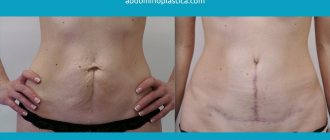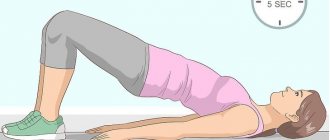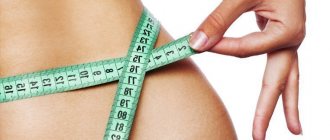Causes of weight gain during pregnancy
There are cases when young mothers do not gain a single extra kg during pregnancy. This is usually due to genetics and body type. However, most women still face the problem of excess weight after childbirth. “Pregnancy leaves its natural imprint on a woman’s body: often during pregnancy we move less, eat more, and taste preferences can change significantly,” says the rehabilitation specialist at the sports medicine clinic. “The body does what nature intended to carry the baby as safely and comfortably as possible and prepare for its birth. Therefore, weight gain during pregnancy is an absolutely normal situation.”
First of all, there is no need to panic and you should be patient. “During pregnancy, body weight increases, and this is normal - on average, a woman can gain 9-14 kg. Firstly, the fetus itself, amniotic fluid and the enlarged uterus,” explains an expert in the group programs of the largest fitness club in Russia. - Secondly, adipose tissue, which accumulates mainly in the abdomen and thighs to protect the fetus and, in addition, serves as an additional reserve of energy to ensure the survival of the mother and unborn child in case of unforeseen circumstances. This mechanism is physiologically inherent in a woman’s body, and fighting it is pointless and unsafe. In addition, an increase in the mammary glands and the volume of circulating blood also adds weight.
Pregnancy lasts 9 months, and it’s stupid to expect that the form will be restored in a month or two - at least the same amount of time should pass.”
Therefore, experts recommend not to panic because of the “gain”, not to go on strict diets, but to focus, first of all, on motherhood and improving your own well-being.
Why diets are dangerous
Normalizing body weight after childbirth is a difficult task. First of all, this is due to the fact that the use of most diets in the early postpartum period and during breastfeeding is strictly contraindicated. An unbalanced diet, a lack of calories, proteins, fats, carbohydrates, vitamins, macro- and microelements can cause serious health problems in the mother - from hypovitaminosis and osteoporosis to chronic diseases of the liver, gastrointestinal tract and other systems. In addition, with inadequate nutrition, lactation decreases and the child suffers, who no longer has enough milk and the substances it contains. That is why any unbalanced diets (no-carbohydrate, protein, mono-diets - buckwheat, banana, etc.) should never be used. But it is possible and even necessary to fight excess weight after childbirth - only competently.
When can you start losing weight after giving birth?
There is no clear answer to this question. “Regarding the weight loss process, there is no reason to wait for any specific period, but only if your diet is balanced. In reality, most women are ready for this after only a couple of months or six months, says Evgenia Mayevskaya, Ph.D., gastroenterologist and nutritionist at GMS Clinic.
After giving birth, many women strive to begin to return their body to its “pre-pregnancy” appearance as soon as possible. “But there is no need to rush this process. If there are no contraindications, the mother feels comfortable and sleeps enough, then the process of gradual, competent weight loss can begin after lactation has completely improved. But this is an ideal situation; in reality, young mothers don’t get enough sleep, the baby cries or is capricious, and there are just more household chores,” explains the rehabilitation specialist at the sports medicine clinic. — The result is a tired body and an exhausted nervous system. It’s pointless to start losing weight in this state: even if you push yourself into strict limits and lose a few kilograms, they will return as soon as the resource of moral and volitional efforts runs out.”
Additional factors that promote weight loss after childbirth
They can be used as auxiliary methods that enhance the effect of the main method chosen for weight loss:
- Massage
It is impossible to break down fat cells by massaging problem areas, but you can stimulate blood circulation, improve lymph movement and increase muscle tone, which, in turn, will lead to a decrease in the volume of fat deposits. In accessible places, massage can be done on your own, but it is better to turn to professionals for a comprehensive procedure. Modern salons offer not only regular hand massage, but also hardware massage techniques. The use of a special massage cream will help warm up the skin and improve blood circulation.
- Dream
Scientists have conducted research and found that adequate sleep helps fight excess weight, and women who spend more than 5 hours a day sleeping are less likely to be overweight. This is explained by the fact that lack of sleep contributes to the release of cortisol into the blood, a hormone responsible for weight gain.
Sleep helps replenish energy, which is otherwise replenished by high-calorie foods, and this, of course, is reflected in the figure. That is why, after putting the child to bed, a woman should not rush to the stove or sink, trying to do all the household chores at once. At this time, it is better for her to rest and sleep on her own.
- Calm
At first, a young mother experiences almost constant stress. She worries about the baby’s health, worries about his development, etc. Stress hormones increase appetite, so a woman constantly strives to eat negative experiences with something tasty. It's better to think about how to stay calm. To do this, you can use yoga classes, breathing exercises, soothing baths and other methods that help you relax and escape from your worries.
Balance your diet during and immediately after feeding
You should not undereat while feeding. This way you can deprive your baby of essential vitamins and even cause toxins to appear in the milk. Daily breastfeeding will require a lot of energy - approximately 500 kcal per day. “It is worth remembering that breast milk is obtained from the mother’s lymph and blood, so all preservatives, dyes and stabilizers can enter breast milk, causing negative reactions (including skin reactions) in the child,” says Evgenia Mayevskaya. — Therefore, you need to build your diet with a minimum of such products, or better yet, exclude them. For smooth weight loss, you need to reduce your caloric intake by about 300-350 kcal from the original, taking into account that a woman secretes up to 40 g of fat per day through breast milk, and then the process of weight loss will not take long.”
Here are some general nutritional recommendations from Evgenia Mayevskaya:
- It is necessary to include proteins, fats and carbohydrates in the diet, as well as fiber in the form of non-starchy vegetables (about 400 g);
- No need to starve;
- It is important to drink enough liquid (approximately 1.8-2.0 liters including water and other drinks);
- Limit the amount of simple carbohydrates through sweets and baked goods (contain a lot of fat and sugar);
- Leave natural sugars in the form of fruit (about 250-300 g);
- Additionally, take preventive doses of vitamin D;
- It is acceptable to take iodine, iron, calcium and multivitamins, but only after consulting a doctor.
Also remember that a nursing mother’s meals should be fractional – 4-5 times a day. You need to eat right! The diet should include complete proteins (lean meat, fish), foods rich in calcium (for example, low-fat cheese 10–17%), fruits and vegetables. Avoid rich meat broths, fish soup and borscht: they contain a lot of extractive substances that are slowly digested and thereby complicate the body’s recovery.
Eat small portions every two to three hours - this will make it easier for you not to overeat.
Consult with doctors
Be sure to see your doctor for one year after giving birth. 6 months after the baby is born, have a complete blood count and hormone tests done. It is necessary to make sure that the hormonal levels have stabilized.
If you cannot lose weight for a long time, go for a consultation with an endocrinologist and nutritionist. Perhaps after childbirth the functioning of the endocrine system or metabolism was disrupted. In addition, you should definitely go to the doctor if, within 2-3 months after giving birth, your ovarian function is not restored and menstruation does not begin.
Forget about Hollywood stars
“Envy Heidi Klum, a mother of four children, who still manages to look perfect? In vain! - says the modeling agency nutritionist. “Sharp weight loss after the birth of a child (within 2-3 months) can negatively affect metabolism, lead to loss of milk and subsequently affect your health and the health of the baby.”
Remember: a whole army of nannies and nutritionists helps the stars. Monitoring the condition of your body is part of the profession of Hollywood divas. Unless you're a fashion model, TV presenter or singer, you don't have to get back into shape in record time. And if you’re a fashion model, you don’t have to either: health comes first!
Why you need to lose excess weight after childbirth
Some people take the extra pounds that appear after childbirth calmly, taking them for granted. “Everyone gets fat after childbirth, this is normal” - this opinion can often be heard from pregnant women or women who have recently given birth. Yes, this is normal, but losing excess weight after childbirth is also normal and, moreover, beneficial for the woman herself.
But the time it takes for each woman to return to her previous weight is different - for some, 1-2 months are enough, while for others, losing weight may take several years. There are no and cannot be any reasons to live with excess weight after childbirth; any doctor or nutritionist can confirm this with 100% confidence. There are several factors that create inconvenience and help a woman understand that excess weight is bad:
- Dissatisfaction with your appearance
It is important for a woman to please herself and others. When she is dissatisfied with her own reflection in the mirror, her mood worsens, and this, in turn, affects loved ones - child, husband, friends.
- The need to change your wardrobe
Buying new things always brings joy, but not if they are acquired as a result of weight gain. Overweight people often experience stress from shopping, as they are forced to once again look in the mirror at their folds and spend a long time looking for a suitable outfit to hide the “excess.” In addition, a new wardrobe is always a waste of money, which can be stressful for a new mother.
- Physical discomfort
Overweight people suffer from shortness of breath after walking quickly only a few tens of meters. They sweat and get tired quickly. Their feet swell and they have problems with simple operations (tying shoelaces, washing the floor, etc.).
- Possibility of health problems
- Risk of developing serious illnesses
Excess weight can cause the development of some serious diseases - diabetes, heart disease, blood vessels, joints, etc., each of which shortens a person’s life by several years.
- The likelihood of problems occurring in subsequent pregnancies.
A fairly common myth is the idea that getting rid of the pounds gained after childbirth is much easier than usual. Many people firmly believe in this, so they are in no hurry to lose weight, thinking that they can easily do it at any time. In fact, the reason why excess weight appeared does not matter to the body. And if the kilograms “accumulated” throughout pregnancy, then the body will also need about 9 months to lose weight.
There are no uniform standards for the time to lose weight after childbirth; everything happens individually and depends not only on objective reasons, but also on the efforts of the woman herself. And “stars” who appear on stage 2-3 weeks after giving birth are not role models, because by doing so they create additional risks for their own health and the health of the baby. It is better to achieve results slowly and gradually, consolidating each success in the difficult task of losing weight.
Don't eat depression
The main enemy of weight loss after pregnancy is postpartum depression. Most often, it is what contributes to nervous breakdowns and overeating.
Symptoms of postpartum depression: unreasonable tears, irritability, headaches, fatigue, sleep disorders. “During pregnancy, the level of hormones (estrogen and progesterone) in a woman’s body increases,” says an endocrinologist. — These hormones are responsible for the preservation and proper course of pregnancy. Immediately after childbirth, their levels drop sharply, and a new hormone, prolactin, begins to be produced. The body is being rebuilt rapidly – hence the mood swings.” You need to fight them not with food, but with the help, for example, of playing sports. The support of loved ones is very important. If depression is severe, it is better to consult a specialist.
Don't rush to the gym - take a walk in the fresh air
You shouldn’t immediately try to do everything that you could do before in a fitness club. At first, just walk longer with your baby in the fresh air. Start with 20 minutes a day, then increase your walking time and walking pace. Twenty minutes of brisk walking with a stroller burns about 150 kcal. “Walking is mandatory for both the baby and the mother - walking, being the most natural and safest type of cardio exercise, will help improve lymph flow and blood circulation, help saturate tissues with oxygen, and gradually tone muscles,” adds the expert in group programs .
Get into training mode correctly
During pregnancy, the body undergoes quite dramatic changes. “A growing belly and a shifting center of gravity can lead to an increase in lumbar lordosis and, accordingly, discomfort in this area; the lower ribs diverge, changing the shape of the chest; the diaphragm, supported from below, rises and “freezes” during the exhalation phase, which affects breathing. Therefore, at first, classes should be aimed at improving mobility of the lower back and chest and breathing, says an expert in group programs. — No sudden or intense movements, everything is as smooth and calm as possible. In the first 10-14 days after birth, when the volume of the uterus decreases, you should give preference to exercises while lying down. This can be gentle rocking and circular movements of the pelvis, aimed at improving mobility of the lower back, breathing with an emphasis on the movement of the ribs and diaphragm. Gradually, you can move on to sitting exercises (a fitball is perfect) - similar pelvic rotations, chest movements, breathing.”
After 1-2 months, you can move on to more active activities. Before this, you should check for the presence of diastasis. “Diastasis is a stretching of the linea alba, causing the rectus abdominis muscles to literally move apart, causing them to not work properly. If this problem is not addressed, then dysfunction of the abdominal muscles over time can lead to lower back pain, protrusions and hernias, and prolapse of organs. In addition, visually the stomach will remain protruding or hanging, even despite training and weight loss,” says the fitness trainer.
How to check if you have diastasis? Lie on the floor with your knees bent and your feet flat on the floor. Place one hand under your head and get ready to palpate your stomach with the other. “Raise your shoulders and shoulder blades and feel the linea alba of your abdomen (from the xiphoid process of the sternum to the navel and a little lower), paying attention to the distance between the abdominal muscles (you can clearly feel the edges of the muscles and the soft tissue between them, where your fingers literally fall through, if not - great, you don’t have diastasis). Then relax and lower yourself to the floor. Pre-activate your internal muscles—tighten your pelvic floor and transverse abdominis muscles, pulling your stomach in slightly, and then lift your shoulders and shoulder blades back up. Palpate the abdomen again and compare the sensations - if the abdomen has become hard and the fingers do not fall through, then the diastasis can be removed by working on the internal muscles, but if nothing has changed and the width of the diastasis is more than 4 cm, surgery may be required,” she adds.
“If a mother is diagnosed with diastasis or there is a suspicion of diastasis, the usual, well-known types of abdominal exercises are categorically not recommended: folding, leg lifting and body lifting, twisting, corner, etc. They can lead to a worsening of the situation with diastasis. But there is a way out of this situation - a set of exercises for a gentle postpartum recovery. They consistently strengthen the abdominal muscles and eliminate all symptoms of diastasis. After some time, the young mother will be able to do her favorite exercises,” she adds.
Weak pelvic floor muscles can also be a limitation to exercise. “These small muscles, like the abdominal muscles, are located in the perineum and are an integral part of the “internal cylinder”. Their weakness can be expressed in organ prolapse, symptoms of urine leakage when coughing and sneezing, when jumping, and in discomfort during sexual intercourse. If a young mother decides to exercise, she needs to make sure that there is no prolapse of organs or weakness of the pelvic floor muscles,” says a rehabilitation specialist at a sports medicine clinic.
4-6 weeks after vaginal birth, you can begin gentle training. If you gave birth by caesarean section, you will have to wait longer - 6-8 weeks: the stitches on the abdomen must heal completely. “To continue recovery after childbirth, Pilates, yoga, swimming and water aerobics are great during this period. During lactation, you should reduce the load on the chest muscles, and also avoid jumping to avoid injury to the mammary glands. Of course, you should avoid any intense training that causes an increase in adrenaline levels, as this will negatively affect the quality and quantity of milk. Any intense workout is stressful, and under stress, the body switches to energy saving and survival mode,” adds the fitness trainer.
You can start training fully 4-5 months after giving birth - yoga, Pilates, and light running are suitable. After finishing feeding, more intense exercises are possible - dancing, water aerobics. Many fitness clubs have special programs for mothers and babies.
You can also train at home while your child is sleeping. Do simple exercises for all muscle groups (here and here) and pay attention to stretching. And when the child wakes up, try to involve him in the activities.
Feeling better after childbirth and losing weight
Authors : La Leche League International
So, the birth is over... You managed to count the baby's fingers and toes, peacefully rocking him to sleep, and then your attention turns to... your own body. What happened to him after pregnancy and childbirth? The sight of a sagging belly after childbirth inspires horror even in the thinnest and most confident women, not to mention the rest. Getting used to the appearance of the body after childbirth is often more difficult than adapting to pregnancy. During pregnancy, a woman's body undergoes the most dramatic changes of the entire post-adolescent period. Just like during puberty, the body seems to be no longer under our control. A wave of mysterious hormonal changes overwhelms you with emotions, just like during the anxious adolescence. After the birth of a child, the stress of sleepless nights and full responsibility for a new creature accumulates, exacerbating the severity of worries about appearance and physical fitness after childbirth. The new body is in no way reminiscent of the familiar one before pregnancy. It doesn’t look like the recent tight roundness of my growing belly either. Instead, we end up with loose skin and a fat belly. The hope that after childbirth everything would automatically retract and resolve did not materialize. Most women want to return to their pre-pregnancy shape as quickly as possible and get upset when a few extra pounds not only don’t want to go away, but are also concentrated in unnecessary places.
Changes during pregnancy During pregnancy, a woman gains weight not only from the weight of the growing baby, but also about seven kilograms of additional weight due to the placenta, amniotic fluid, an enlarged uterus and mammary glands, additional blood volume, plus another three kilograms of fat reserves. All this is necessary for the healthy development of the child and the well-being of the mother. After giving birth, a woman immediately loses some of the weight she gained - the sum of the weight of the baby, placenta and amniotic fluid. Over the course of several days after birth, the extra blood and fluid previously needed to support the pregnancy is gradually absorbed and eliminated from the mother's body. The uterus returns to its pre-pregnancy size within six weeks after birth. But the fat accumulated during pregnancy does not go away. The female body tries to accumulate fat to nourish the fetus during pregnancy, and then to feed the already born child. For a long time, scientists mistakenly believed that new fat cells form only during infancy and adolescence. Recent studies have shown that women accumulate new fat cells even in the third trimester of pregnancy. This new discovery explains why many women find it difficult to lose weight after giving birth, even if they previously managed it without any problems. Fat cells do not disappear, although they can be “shrinked” or reduced through diet or exercise. However, once fat cells have already formed, they are always ready to store energy. This is how the body protects both the woman and the child from hunger. Unfortunately, in cultures where thinness is fashionable rather than curvy, fat accumulated during a healthy pregnancy is often unfairly labeled "baby fat." It is believed that the weight gained during pregnancy should and can be lost and returned to pre-pregnancy forms as quickly as possible. Those who give birth often do not understand that the body has accumulated “fat” for a reason, but for a very specific purpose - to protect the child from hunger. Despite all the preparations for the birth of a baby, many women are not at all ready for the body changes that accompany pregnancy and childbirth. The breasts become fuller and heavier because milk has appeared in them. Unaccustomed nipples may be too sensitive when a hungry baby nurses. Until recently, the dense and rounded belly where the baby lived is now empty, and the skin and muscles of the abdomen are stretched and hanging.
Helplessness Many women are not prepared for the fact that after the birth of a child they will not immediately be able to return to their pre-pregnancy form and lose all the weight gained during pregnancy. In addition to this, husband, relatives, friends and media images add fuel to the fire - “the birth of a child is not a reason to dissolve.” And yet, many women try to lose weight. Some people try to curb their life out of control in this way. Thoughts appear in my head like: “Life is topsy-turvy, I hardly sleep. The child screams all the time. I can't wash the dishes. But I can lose weight.” This line of reasoning is especially true for women who have previously suffered from eating disorders. There is a potential link between exposure to eating disorders and an increased desire to control one's life. Some mothers are discouraged by the intensity of the physical relationship between mother and newborn baby. If the husband insists on resuming the marital relationship, the feeling of helplessness and complete loss of his own body may increase. Sometimes a woman asks the question “when will I belong to myself again?”
Lack of support The postpartum period is very different from the months of waiting for a baby. During pregnancy, a woman often finds herself the center of attention. This is pleasant and has a positive effect on both appearance and well-being. Sheila Kitzinger notes in The Year After Childbirth: “Perhaps many women enjoy pregnancy because, with society's tacit approval, they don't have to be unnaturally thin.” If a woman before pregnancy constantly struggled with her own weight, went on diets, lost weight and was dissatisfied with her figure and weight, very often during a nine-month respite she can relax and enjoy life, not paying attention to calories and weight. After the baby is born, the mother's other support systems may also be shaken. During pregnancy, women are surrounded by care and attention from relatives, doctors, and even complete strangers on the street or in transport. Immediately after the birth of a baby, a woman often finds herself isolated from society. The attention and care of others goes to the child, and the woman seems to fade into the background. If someone remembers their mother, most often people notice how she looks, and not how the woman feels. This is especially true for people who are not very close. You often hear: “Oh, how you’ve lost weight!” instead of “Well done, what are you feeding!” With that said, losing weight can be one way to attract positive attention from others. Who among us doesn't like compliments?! Another threat emanates from television screens and the pages of magazines and newspapers - the image of a mother who “does everything.” In almost every broadcast of an award ceremony for actors or singers, we are shown at least one celebrity who gave birth just a couple of weeks ago, but through exercise and diet, she got herself into a tight evening dress. It's no secret that famous actresses and singers try to lose weight quickly because they get paid for the way they look. Why do many women unfairly reproach themselves for their inability to fit into pre-pregnancy jeans or a dress? Celebrities pay maids to clean the house, nannies to look after their children while they fast and exercise with a personal trainer. We must not forget that most of us did not look like models at all before pregnancy. In addition, excessive exercise in the early postpartum period interferes with the healing of the uterus. While some people go on a diet to control the situation, some women, on the contrary, begin to eat more after giving birth. Motherhood so absorbs all a woman’s time, thoughts and efforts that food can become a way to pay attention to yourself, calm down, dispel sadness, have a good time, shake off fatigue or add variety to the monotony of the day. Considering that calories are burned during lactation and feeding, increasing your daily food intake with healthy, natural foods may be harmless, or even beneficial. Beware of sweets and fatty foods! Although they are tasty, they are easy to gain weight from. Short-term pleasure can quickly give way to even greater self-dissatisfaction.
Let's lose weight! Feeding takes about 500-600 calories per day. Thus, feeding is beneficial not only for the baby, but also for the mother - she can lose weight while breastfeeding. The weight you gain during pregnancy will go away over time, although it may not be as quickly as many people hope. Here's what the BREASTFEEDING ANSWER BOOK says: "Compared with women who formula feed and consume fewer calories, breastfeeding mothers lose more weight between three and six months after giving birth." One study found that at four weeks postpartum, women who breastfed (either fully or partially) weighed less and had thinner thighs than women who formula-fed.” During breastfeeding, you can get rid of not only the weight gained during pregnancy, but also lose pre-pregnancy fat reserves. If you decide to lose weight through dieting or dietary restrictions, wait at least six weeks after giving birth. This is the minimum period required for recovery after childbirth and the establishment of lactation. Rapid weight loss can lead to a decrease in the amount of milk produced. Check with your doctor to see if this or that diet or any sport is contraindicated, especially if you suffer from chronic diseases. And if you are already planning to lose weight, do not go off course, but at the same time, do not rush and do not torture yourself. Remember the wisdom of “gradually and lovingly.” You recovered for nine months, and most likely you did not need to care for a baby who was completely dependent on you. Don't rush to change your life and yourself in one day. A healthy body and a toned body will not appear overnight. You can achieve results only by constantly treating yourself well – eating healthy and exercising. Those who lose weight quickly tend to gain the weight back quickly. Breastfeeding helps you lose weight after giving birth, but not everyone loses weight at the same rate. If the mothers you know have already lost weight and boast of flat stomachs, and you still have not achieved your goal, you are not far from grief and frustration about your weight and appearance. One way to avoid disappointment is to set a goal that is realistic and suitable for you personally. For example, don't try to lose weight to the size of a famous model. Think about the largest clothing size that will suit you. Or try to get to the weight you held for a year when you were already an adult woman, instead of trying to lose weight to the size of yourself as a graduate girl. Losing weight can have different goals, and having achieved one, you can move on to achieving another. Sometimes it’s enough for a woman to just be in shape and not get out of breath while running after children around the playground or climbing the stairs. Many people feel better both psychologically and physically after losing five to ten percent of their weight. And someone simply cannot truly enjoy the fullness of the feeling of happiness if they do not keep themselves in shape. So, a start has been made. How to avoid losing track of your goal? Write down all your achievements along the way to the goal, be it exercising for 15 to 45 minutes, losing a kilogram, or refusing dessert at a friend's birthday party. Don't get hung up on the scale readings. Pay attention to the change in the volume of the chest, waist, hips, ankles. How did the pressure and endurance change? Do you notice that your clothes fit better? Often during weight loss there is a period when weight loss slows down or even stops. Do not despair! Focus on other goals for now and continue to eat healthy and exercise. If you decide to treat yourself, avoid food “prizes”. Over time, you will look back and see how you yourself have changed, how you look, and most importantly, how your sense of self and well-being has changed. Another way to cheer yourself up is to imagine yourself in good shape. Admire the body parts that you like about yourself. Avoid strict or restrictive diets, which can increase hunger and affect your milk supply. Radical diets do not go well with child care. Try to eat regularly and often, but in small portions. Choose healthy foods using common sense. Don't forget to have breakfast. Skipping meals does not help you lose weight. If you don't have breakfast or lunch, your body's metabolism slows down. Breakfast is very important, especially after a long night's break, to get a new boost of energy. Remember to drink at least eight to ten glasses of water a day. If you tend to snack on the go throughout the day, drink a glass of water every time you want to eat. Sometimes it's easy to confuse thirst with hunger. Try to always have a bottle of water with you, especially during the hot season. Most of us need to exercise regularly to maintain a healthy weight. We move less and less, while our body is designed for daily physical activity. After the baby is born, you can simply go for a walk with a stroller or sling. Walks can be gradually lengthened, the pace of walking can be accelerated, but start with short and easy walks. When you have already started exercising, try to increase the time of exercise to 30-45 minutes at a time. The more regular the classes, the more likely it is that you will get used to the load and not quit. Exercise not only helps you burn fat, but it also increases your energy levels, improves your well-being, and reduces stress levels and PMS symptoms. Physical activity compensates for the slowdown in metabolism that is associated with weight loss. And most importantly, physical activity combined with a balanced diet guarantees more noticeable and long-term results. People who exercise in addition to their diet lose weight faster and are less likely to gain weight again. Pay attention to the list of useful tips about playing sports at the end of the article.
There are no easy ways. Occasionally a woman strives to lose weight at any cost. Despite the proven fact that breastfeeding women lose more weight in the first year after giving birth, such a woman decides to stop breastfeeding or even not start at all in order to immediately go on a radical diet that gives quick results immediately after giving birth. Are such drastic measures justified if with a reasonable and balanced approach you can both feed and lose weight? Recently, commercial nutrition centers have become popular and, in response to growing demand, offer special weight loss programs for breastfeeding women. The developed diets may or may not be suitable for nursing mothers in terms of calories, taking into account energy costs. A study by James Hill, a nutritionist at the University of Colorado in Denver (USA), found that up to 90% of diet center clients do not complete the weight loss program, and the few who do complete the course gain weight again. No diet program guarantees results for those who want to lose weight. If you are thinking about quitting breastfeeding to go on a “magic” diet, think twice. Is it worth giving up the benefits of feeding for both you and your baby for the sake of the illusory hope of losing weight, when all the facts indicate that there are no magic or easy ways?
Kilograms? Kilograms of experience and happiness! And finally, let's look at everything that has happened to you since the birth of your child. Not only did you gain weight, but you also gave birth to a baby! Surely, in the corners of your memory there are precious minutes stored when the baby was happy simply that you exist, your voice, smile and body warmth. You learned to be strong when your baby was sick. By channeling the impulses of your little curious explorer, you have become wiser. And of course, you discovered that sometimes even an imperfect body can feed a person! Rejoice and appreciate the well-deserved beauty of the mother's body, its physical and emotional strength. Compared to the new beauty, strength, wisdom and abilities of your body, a few kilograms mean nothing.
Exercises along the way and other tips
- Park your car away from the store entrance.
- Take the stairs on foot.
- Take a walk around your house or neighborhood before lunch.
- Walk in place when talking on the phone.
- Play with your children outside.
- Try to stand more. Standing burns twice as many calories as sitting.
- Convince yourself to walk to the nearest store. Most likely, you will walk further than you intended.
- Find a friend to go on walks, bike rides and play sports together.
- Start exercising gradually to avoid injury and muscle pain. Don't forget about warming up and stretching.
- Smile during class, even if you don’t feel like it and no one is watching.
- After finishing your classes, praise yourself for the exercises you completed. Remember this pleasant feeling before starting your next lesson, especially if you don’t feel like doing it.
- Take your classes seriously. Regular exercise is as important as brushing your teeth or taking a bath. Taking care of yourself is just as important as cleaning your home.
published 26/02/2014 13:57 updated 13/06/2016 — Women's health
Have sex
Doctors recommend abstaining from sexual intercourse for 6-8 weeks after giving birth. But there are no strict restrictions on this issue. Resume sexual activity when you feel that you are emotionally ready for it. And intimate gymnastics will help you physically prepare for your return to the world of sex.
After natural childbirth, the volume of the vagina increases greatly. To restore the tone of the perineal muscles, start training them 2-3 months after giving birth, preferably daily.
Special gymnastics for women was invented back in the last century by the American gynecologist Arnold Kegel. Kegel exercises involve contracting the pelvic muscles that support the vagina.
- Squeeze your vaginal muscles for 10 seconds and then relax for 10 seconds. Perform these movements for 5 minutes a day, and then do quick contractions every second for a minute.
- “Elevator”: slightly contract the lowest vaginal muscles (“1st floor”), hold for 3-5 seconds, then contract the area above (“2nd floor”), hold again. So go 4-5 “floors” up and down, “lingering” on each of them.
You can perform these exercises in any position: sitting, lying, standing.
What not to do when trying to lose weight after childbirth
The process of weight loss should be gradual. “You shouldn’t just “go on diets,” especially those that strictly exclude certain foods, mono-diets that strictly limit calories (juice diets and fasting) - this way, first of all, you will very quickly achieve a vitamin and mineral deficiency, which is negative affect your health,” warns Evgenia Mayevskaya. - The fact is that regardless of what a woman eats, breast milk will still be full, this is determined genetically, but a woman can get anemia, tooth decay, a decrease in bone mineral density, damage to the skin and its appendages, and the nervous system. such nutrition."
How to prepare for the birth of a baby if doctors predict possible complications?
Most of the complications described above can be prevented or managed in the delivery room, without long-term consequences for the health of the mother and her baby. If complications or their increased risk are identified in advance, the antenatal clinic doctor should monitor the woman more carefully and make appointments more often. Consultations with other doctors may be required: cardiologist, endocrinologist, geneticist, etc. If necessary, drug therapy and hospitalization in a hospital “for conservation” are prescribed. If it becomes clear that the expectant mother is contraindicated to give birth on her own, then she is prepared for a caesarean section. Sometimes this operation has to be performed as an emergency.
In turn, the expectant mother must take responsibility for her health and follow the recommendations of doctors:
- devote sufficient time to rest, sleep and physical activity;
- adhere to a healthy, nutritious diet;
- stop smoking, do not drink alcohol;
- take recommended vitamin and mineral complexes;
- Visit a doctor at the antenatal clinic in a timely manner and take all necessary tests.









